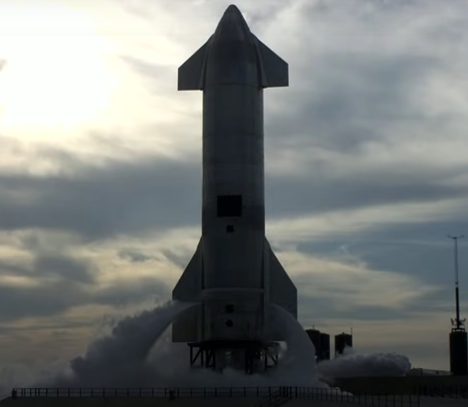Exploration proves more crucial; SpaceX makes progress in landing techniques

Starship SN10 about to take off for the landing test. SpaceX continued to advance in space exploration.
March 18, 2021
“We would learn a great deal as we always do when we push the boundaries of exploration,” states science teacher Timothy Dougherty. Space and sea exploration remain in the spotlight as advancements come to light.
“On Wednesday, March 3, Starship serial number (SN10) completed SpaceX’s third high-altitude flight test of a Starship prototype from our site in Cameron County, Texas,” says SpaceX. This starship ended up successfully landing, but only minutes later, blowing up.
Alexis Bultman, a 2020 graduate, says that regardless of the fact the starship blew up, it was still successful. Bultman believes it is one step closer to the technology needed to finally figure out how to land a rocket upright. “In the past, we could never land a rocket upright because we did not have the technology at the time so, when it would come back to earth, we always had to escape the capsule with a parachute attached to it while the rocket would be lost in space or blown up.”
Bultman describes this method of landing as a “waste”, and if SpaceX can find a way to land these rockets upright, that “this new type of rocket could make space travel [and exploration] more efficient and less expensive.” Along with that Bultman believes that space exploration is crucial for our future and that the discoveries are endless.
“Even though I love the ocean I’m more interested in the exploration of space because although the ocean is huge, it has its limits because it’s on earth,” also mentions Bultman. “The ocean is the lifeblood of Earth, covering more than 70 percent of the planet’s surface, driving weather, regulating temperature, and ultimately supporting all living organisms. Throughout history, the ocean has been a vital source of sustenance, transport, commerce, growth, and inspiration,” states NOAA. The ocean is still small compared to the universe as we know it, but at the same time more than 80% of the ocean is unexplored also states NOAA.
Some people believe that focusing on what is already on Earth is more important than expanding discoveries beyond our planet because it is infinite. Bultman disagrees, “The sun is supposed to engulf us in about 7.5 billion years, so we need to find another planet to live on. For that reason alone, I think we need to put more effort and money into space exploration. It is a life-or-death situation.” Bultman believes that our research and our money should go towards our “future” versus our “present”.
According to Branka Vuleta from Seed Scientific, “72% of Americans say it’s important for the US to have a strong space program.” Meaning only 28% disagreed that space exploration should not have a strong program.










